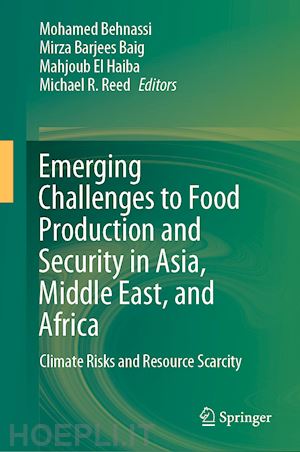
Questo prodotto usufruisce delle SPEDIZIONI GRATIS
selezionando l'opzione Corriere Veloce in fase di ordine.
Pagabile anche con Carta della cultura giovani e del merito, 18App Bonus Cultura e Carta del Docente
This book, as a part of a series of CERES publications, provides a multi-regional and cross-sectoral analysis of food and water security, especially in the era of climate risks, biodiversity loss, pressure on scarce resources, especially land and water, increasing global population, and changing dietary preferences. It includes both conceptual research and empirically-based studies, which provides context-specific analyses and recommendations based on a variety of case studies from Africa, Middle East, and Asia regarding the fostering of long-term resilience of food and water security. The core approach of the volume consists of: assessing the structural drivers affecting the vulnerability of food and water security, under the persistence of current trends; identifying the best solutions and practices to enhance the climate resilience for food and water security; and fostering climate adaptation and biodiversity protection for food and water security.
Dr. Mohamed Behnassi is Professor at the College of Law, Economics, and Social Sciences, Ibn Zohr University of Agadir, Morocco. He is a Senior Researcher of international law and politics of environment and human security. He holds a PhD in International Environmental Law and Governance (Hassan II University of Casablanca, 2003) and a Diploma in International Environmental Law and Diplomacy (University of Eastern Finland and UNEP, 2015). He is currently the Founding Director of the Center for Environment, Human Security and Governance (CERES) – Former North-South Center for Social Sciences (NRCS). From 2015 to 2018, he was the Director of the Research Laboratory for Territorial Governance, Human Security and Sustainability (LAGOS) in the same university. Recently, he was appointed as Expert Evaluator for the National Center for Scientific and Technical Research (CNRST/Morocco), and selected as Expert by the Intergovernmental Science-Policy Platform on Biodiversity and Ecosystem Services (IPBES) and the Mediterranean Experts on Climate and Environmental Change (MEDECC) to take part in global and regional assessments, respectively. Accordingly, he is among the Lead Authors who elaborate the 1st Assessment Report (MAR1): Climate and Environmental Change in the Mediterranean Basin - Current Situation and Risks for the Future (MEDECC, 2021). Dr. Behnassi has published considerable number of scientific papers and book chapters in addition to 15 books, including Human and Environmental Security in the Era of Global Risks (Springer, 2019); Climate Change, Food Security and Natural Resource Management: Perspectives from Africa, Asia and the Pacific Islands (Springer, 2019); Environmental Change and Human Security in Africa and the Middle East (Springer, 2017). He organized as well many international conferences covering the above research areas and managed many research and expertise projects on behalf of various national and international organizations. Dr. Behnassi is regularly requested to provide scientific expertise nationally and internationally. Other professional activities include social compliance auditing and consultancy by monitoring human rights at work and the sustainability of the global supply chain.
Dr. Mirza Barjees Baig is Professor at the Prince Sultan Institute for Environmental, Water and Desert Research, King Saud University, Saudi Arabia. He earned his MS degree in International Agricultural Extension in 1992 from the Utah State University, Logan, Utah, USA and was placed on the ‘Roll of Honor’. He completed his Ph.D. in Extension for Natural Resource Management from the University of Idaho, USA and was honored with the ‘1995 outstanding graduate student award’. Dr. Baig has published extensively on the issues associated with natural resources in the national and international journals. He has also made oral presentations about agriculture and natural resources and role of extension education at various international conferences. Food waste, water management, degradation of natural resources, deteriorating environment and their relationship with society/community are his areas of interest. He has attempted to develop strategies to conserve natural resources, promote environment and develop sustainable communities. Dr. Baig started his scientific career in 1983 as a researcher at the Pakistan Agricultural Research Council, Islamabad, Pakistan. He served at the University of Guelph, Ontario, Canada as the Special Graduate Faculty from 2000-2005. He served as a Foreign Professor at the Allama Iqbal Open University (AIOU), Pakistan through the Higher Education Commission from 2005-2009. He served as a Professor of Agricultural Extension and Rural Society at the King Saud University, Saudi Arabia from 2009-2020. He serves as well on the Editorial Boards of many international journals and the member of many international professional organizations.
Dr. Mahjoub El Haiba is Professor at the College of Law, Economics, and Social Sciences, Hassan II University of Casablanca, Morocco. He graduated from The Hague Academy of International Law, the Centre for Studies and Research in International Law and International Relations in 1984, and in 1994 he had a State Doctorate in Public Law and Political Science from the same University. Dr. El Haiba held many academic and official positions, including being: Former Member of the National Consultative Human Rights Council (2002-2010), and his Secretary General (2005-2010); first Inter-ministerial Delegate for Human Rights (March 2011-December 2018); former Member ex officio of the Higher Council for Education, Training and Scientific Research, and of its Executive Office; nominated Member of The Equity and Reconciliation Instance (IER) (2004-2005); former and current Member of the United Nations’ Human Rights Committee (2008-2011/2020-at present); former Member andPres











Il sito utilizza cookie ed altri strumenti di tracciamento che raccolgono informazioni dal dispositivo dell’utente. Oltre ai cookie tecnici ed analitici aggregati, strettamente necessari per il funzionamento di questo sito web, previo consenso dell’utente possono essere installati cookie di profilazione e marketing e cookie dei social media. Cliccando su “Accetto tutti i cookie” saranno attivate tutte le categorie di cookie. Per accettare solo deterninate categorie di cookie, cliccare invece su “Impostazioni cookie”. Chiudendo il banner o continuando a navigare saranno installati solo cookie tecnici. Per maggiori dettagli, consultare la Cookie Policy.